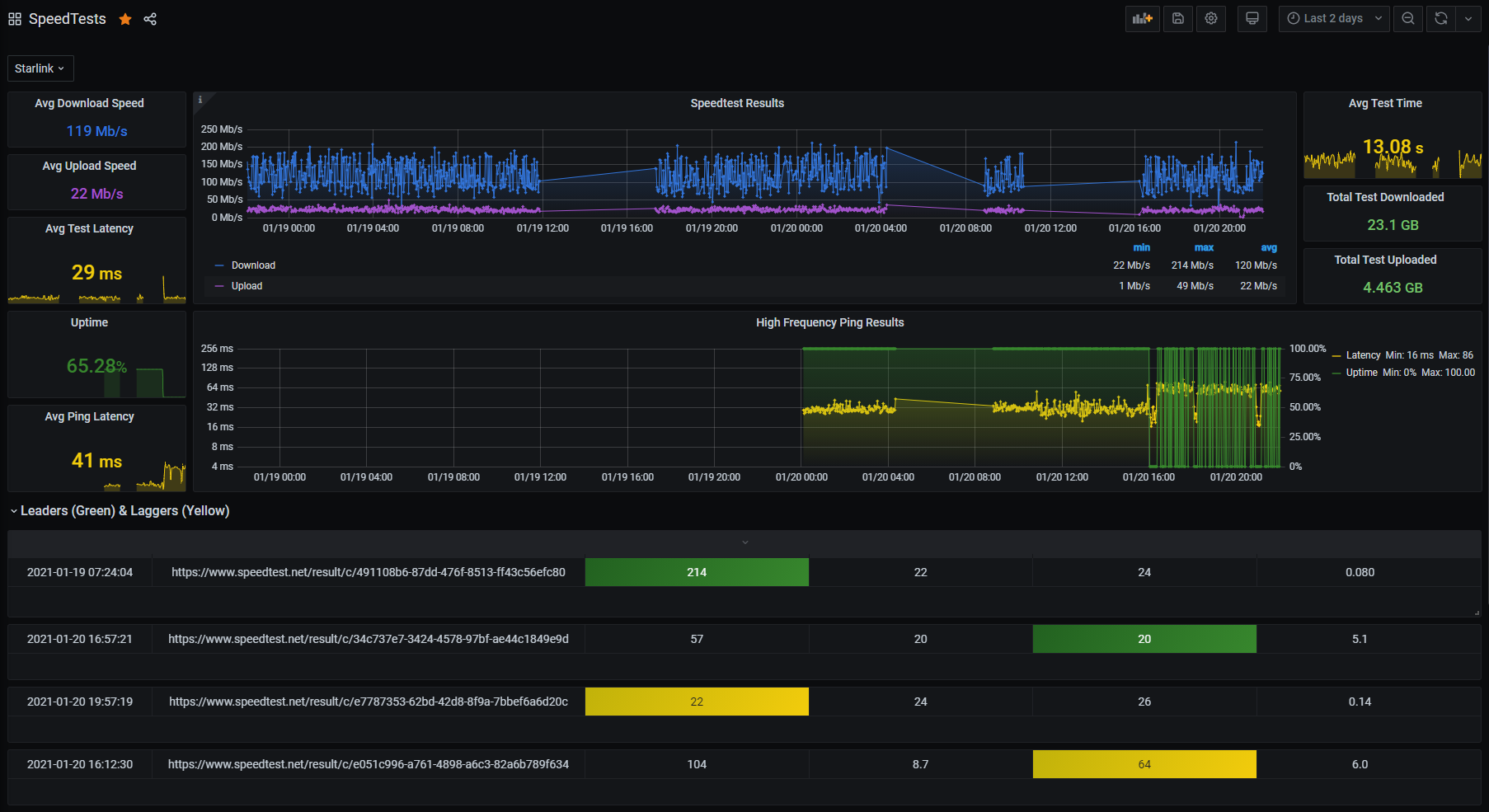This is a Python script that will continuously run the official Speedtest CLI application by Ookla, takes input from environment variables, formats data and writes it to an InfluxDB database.
This script will allow you to measure your internet connections speed and consistency over time. It uses env variables as configuration. It's as easy to use as telling your Docker server a 1 line command and you'll be set. Using Grafana you can start exploring this data easily.
This repository contains an InfluxQA based Grafana dashboard GrafanaDash-SpeedTests.json configuration. To make use of this please follow the InfluxDB guide for managing Grafana and InfluxQL data sources here.
There are some added features to allow some additional details that Ookla provides as tags on your data. Some examples are your current ISP, the interface being used, the server who hosted the test. Overtime, you could identify if some serers are performing better than others.
This work is based upon forks from:
My modifications port their hard work to InfluxDB v2.0 and higher.
Before configuring the speedtest container you must prepare a speedtests data bucket and bucket token.
Also follow the additional instructions for using Grafana with InfluxQL.
The InfluxDB connection settings are controlled by environment variables.
The variables available are:
- NAMESPACE = default - None
- INFLUX_DB_ADDRESS = default - influxdb
- INFLUX_DB_PORT = default - 8086
- INFLUX_DB_ORG = default - {blank}
- INFLUX_DB_TOKEN = default - {blank}
- INFLUX_DB_DATABASE = default - speedtests
- INFLUX_DB_TAGS = default - None * See below for options, '*' widcard for all *
- SPEEDTEST_INTERVAL = default - 5 (minutes)
- SPEEDTEST_SERVER_ID = default - {blank} * id from https://c.speedtest.net/speedtest-servers-static.php *
- PING_INTERVAL = default - 5 (seconds)
- PING_TARGETS = default - 1.1.1.1, 8.8.8.8 (csv of hosts to ping)
- Intervals are in minutes. Script will convert it to seconds.
- If any variables are not needed, don't declare them. Functions will operate with or without most variables.
- Tags should be input without quotes. INFLUX_DB_TAGS = isp, interface, external_ip, server_name, speedtest_url
- NAMESPACE is used to collect data from multiple instances of the container into one database and select which you wish to view in Grafana. i.e. I have one monitoring my Starlink, the other my TELUS connection.
The Ookla speedtest app provides a nice set of data beyond the upload and download speed. The list is below.
| Tag Name | Description |
|---|---|
| isp | Your connections ISP |
| interface | Your devices connection interface |
| internal_ip | Your container or devices IP address |
| interface_mac | Mac address of your devices interface |
| vpn_enabled | Determines if VPN is enabled or not? I wasn't sure what this represented |
| external_ip | Your devices external IP address |
| server_id | The Speedtest ID of the server that was used for testing |
| server_name | Name of the Speedtest server used for testing |
| server_country | Country where the Speedtest server resides |
| server_location | Location where the Speedtest server resides |
| server_host | Hostname of the Speedtest server |
| server_port | Port used by the Speedtest server |
| server_ip | Speedtest server's IP address |
| speedtest_id | ID of the speedtest results. Can be used on their site to see results |
| speedtest_url | Link to the testing results. It provides your results as it would if you tested on their site. |
Be aware that this script will automatically accept the license and GDPR statement so that it can run non-interactively. Make sure you agree with them before running.
-
Build the container.
docker build -t speedtest -f Dockerfile . -
Run the container.
docker run -d -t --name speedflux \ -e 'NAMESPACE'='None' \ -e 'INFLUX_DB_ADDRESS'='influxdb' \ -e 'INFLUX_DB_PORT'='8086' \ -e 'INFLUX_DB_ORG' = 'my-org' \ -e 'INFLUX_DB_TOKEN'='_influx_bucket_token_' \ -e 'INFLUX_DB_DATABASE'='speedtests' \ -e 'SPEEDTEST_INTERVAL'='5' \ -e 'SPEEDTEST_FAIL_INTERVAL'='5' \ -e 'SPEEDTEST_SERVER_ID'='12746' \ qlustor/speedtest_ookla-to-influxdb
- Configure the supplied
docker-compose.ymlfile environment variables - Run
docker-compose up -dto build the stack - Run
docker-compose downto destroy the stack
You may also run InfluxDB as a container in the same stack. Setting the InfluxDB container_name will allow the speedtest container to communicate via hostnames.
